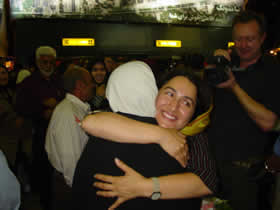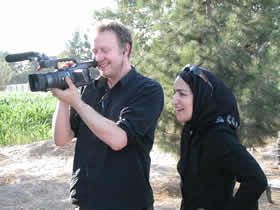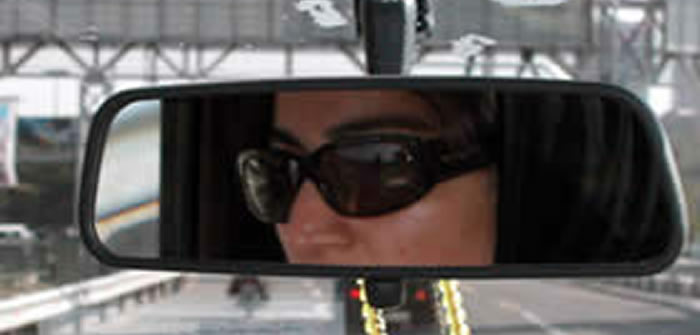An interview with couple Filmmaker Afsar Sonia Shafie and Martin Frei
Synopsis: Afsar Sonia Shafie returns to Iran after an absence of five years. It is here in Tehran that she once again finds the women who have marked her life the most: her grandmother, mother, and sister. Contrary to the preconceived notions reigning in the West, in Shafie’s family it is the women who wear the pants despite their veils…,
Shohreh Jandaghian – How did you come about to return to Iran and shoot “City Walls – My own private Tehran”?
Afsar Sonia Shafie- At the very beginning my plan was to make a film about a few Iranian youngsters from different backgrounds, but all living in Tehran. Using the story of my own life as a red line to connect the different portraits of these youngsters. I had in mind to compare their diverse approach of life with what I experienced in my own teenage days beginning after the revolution. Arriving In Tehran I started to interview my family members asking them questions about myself in different stages of my life. Being very pleased finding somebody to talk to, they began telling me about their own life, and while listening to their stories I discovered things that I didn’t know. How hard my grandma had to work during the Second World War, and how she, at the age of 15 had to take her family’s faith into her own hands. Grandpa was addicted to opium and grandma was obliged to put on the trousers. She told me a lot more while I was listening to come up with new questions. Talking to the women of my family I discovered a new red line: their fight for emancipation, and how they managed to improve the quality of life for themselves and for their children. This entire discovery was possible only thanks to the intense 3 months that it took for the shooting process of “City Walls”. That is when I decided to make a film about the emancipation of three generations of women in my family.
Shohreh – Would you describe briefly how the whole process went from the first concept to the final film? 
Sonia- It all started in 1997, long before I left Iran for Switzerland. I made a film called “Speaker’s corner” in 1998. It was about what Iranian youngsters think and how they express their wishes and dreams. The film was made for an Iranian audience, but unfortunately it has never been screened publicly. I was the producer and director at the same time. In 2002, after I finished my film studies in Switzerland I planed to make a film about the same issue, but for a European and Iranian audience. My husband Martin Frei and I began working on the project that we called “CITY WALLS”. After showing the script to different producers we finally decided working together with Hugofilm productions in 2003. After finalizing the Dossier and raising funds in collaboration with the Production company, which took about one year, we were finally ready to go to Iran in August 2004. It took us 3 months to finish the shooting. Later, in January 2005 the post-production process started. First I worked together with a Swiss editor for a few months, but our collaboration was stopped because she had to start editing another film. I continued the editing myself and the film was finished on April 2006, shortly before its premiere at the festival «Visions du réel»in Nyon, Switzerland, where it got 2 prices.
Shohreh – What was the most difficult part of making the film for you?
Sonia- Well, filmmaking is not easy in all its various phases. It was very complicated to get all the permissions for the filming in Tehran for instance. During the whole time of the shooting we where busy getting the permissions for the “outside shootings”, and we got the last permission the very last day of our stay in Tehran. One spends about 90% of the energy for things like this, and only 10% last for the actual work as a director. The editing phase is a very important but hard part too. And this, out of different reasons: first of all editing “CITY WALLS” was like a therapy for me. I was discovering my Family’s history in what my Interview partners told me, and this was not always easy to face. A cliché that seems to subsist says that a filmmaker can’t edit his own film because she/he does not have enough distance from it. It is the most difficult part indeed, but at the same time maybe the most interesting moment of the whole filmmaking process. It is the time where one finally knits all the strings together. The hard part though was that I was forced to fight with my producer for the right to do this job by myself. In Europe one does not face censorship but there are different obstacles to deal with.
Shohreh – What changes did you see in Iran after being far away for about five years?
Sonia- At first I had impression that everybody was changed, but after a while I realized that I was changed as well. The most obvious change was that people were more open minded than before, they where confronting things in a more easy going way. But, at the same time I discovered that mistrusting one another increased too. Another quite visible change was with the colors, I have seen people wearing brighter and more diverse colors and that was very impressive to me. Before I left Iran people were wearing dark colors. Putting on a light or strong colored Headscarf and dress would get me into problems while walking outside.
Shohreh – You recently screened the film at International Women’s Film Festival Dortmund l Cologne in the special section “Fokus Iran”. How did that go?
Sonia– It was the first time that a bigger Iranian audience was watching my film. I didn’t know how they would react on it, and I was quite nervous about it. We Iranians are a very proud people and we usually try to behave as if every thing has been perfectly fine in our lives! We keep our head high trying not to let somebody see our problems. With my film I do the opposite, I talk about these things. I believe that one has to start looking at the own private history book first. I was a little skeptical about the fact that a lot of Iranians are going to watch the film, but it went on good, people were emotionally moved and that is something that all filmmakers dream about while making a film.
 Shohreh – Is “City Walls – My own private Tehran” a film for Iranian audiences or Western?
Shohreh – Is “City Walls – My own private Tehran” a film for Iranian audiences or Western?
Sonia- This is as much a film for Europeans as for Iranians. They might get different message from it. I try to open a door to my fellow Iranians. By offering them to have a glance into my life I would like to encourage Iranians to open this door to their own history book how ever different it is. For Iranians this might be a first time that an Iranian filmmaker approaches social issues by the means of telling his own story. Doing this I want to show that one shouldn’t be embarrassed about his life and his past, but openly talk about it in order to progress and to fill the lack of understanding. I think it is good to be proud, but it is even more important to see our own mistakes, to look back to be able to take a brave step forward.
Shohreh – What is your message to the Western audiences?
Sonia– In times where headlines about the so-called “culture clash” hunt each other, me Afsar Sonia Shafie as an Iranian filmmaker want to tell a different story: Living in Europe for 6 years, it worries me to see the growing prejudices against the Muslim world in the media and elsewhere. With “City Walls” I want to show a different image of the place I call my home, of what’s nowadays covered behind a simplistic “propaganda wall paper”. I would like to offer the chance to catch a glimpse of everyday life in Iran. I take you behind my city’s walls. Opening my history book, I tell you my own intimate story. I would like to encourage identification, emotion, tolerance and understanding in a world that urgently needs to learn more about its inhabitants. Today we need to show a very honest, personal image of the people we are, in order to work against simplistic concepts and generalizations spread by the media.
Shohreh – What impact did emigration from Iran have on you personally and professionally?
Sonia– Living in another country than your own is a challenge and I took it as an opportunity to learn more about other cultures. Learning about European culture while keeping my own background helps me to have more understanding of both. After all, the cultural basis in both of these cultures is the same. By thinking about differences, but even more so about the common ways, might help us to move towards a future together. We are all human beings and no trees! We have feet to walk on our own; we can stand and rest wherever we try. The only roots we need to carry along are the roots to our heart and intellect. The fact that I know both cultures helps me in my personal and professional life to express myself better, and to give people an understanding of my culture and mentality.
Shohreh – Where makes you feel home to make your films, Iran or Switzerland?
Sonia– I love Iran, my home. Iran is the country of my origin where my loved ones are living. It is the country that shaped my personality. I love its liveliness and its spontaneous people. Every thing is moving so fast, it leaves you no time for thinking, one lives in the moment, and one just has to react. Tomorrow will be a new day and every day brings a lot of new tasks. People are warm-hearted; they laugh a lot, they shout too. Sadness and happiness lie close together. If life is hard you get true happiness from little things. That is how I lived and how I was able to stand up again when ever I fell. Switzerland is my second country, and it is the country where my second family is living. It is the country of my husband’s origin. I love Switzerland because it opened its door to me and it let me fulfill my dream to be a filmmaker. I love its peace; even-though some times it is a little to slow and quiet for my Iranian temper!
Shohreh – Finally, can you tell us about your next project?
Sonia- I am working parallel on two projects at the moment. One is a
long feature fiction and the second project is another feature documentary that I will do together with my husband Martin Frei.
Shohreh – Great! I wish you best success with both projects! And now Martin, please tell us a bit about you and how you got involved with filmmaking?
Martin – From early childhood on I was watching the black and white single 8, and later color Super 8 Films that my Father made. There was a film that I loved a lot; after his studies he went to Greece, together with a couple of friends and he documented the trip. It was a very strange, magical thing to me. I was able to see my Father on screen, in a life that he lived before I was born, before I existed. I got my first film camera when I was a teenager and later, while studying Art, I discovered Video. 1996 I made a first Video- Documentary called “Un Ga Nai- Bad Luck” in Japan.
Shohreh – You have been Co-author and Cameraman of “City Walls-My own private Tehran”. Would you describe your approach to the theme as
co-author of the film?
Martin – Sonia and I got to know each other trough a film project. Soon after, we started working together. Our first collaboration brought us to Armenia; we found that we can work together well. Sonia told me of her Ideas to make a Film about youngsters in Iran. We began working on it, writing, discussing and exchanging ideas, we went to Iran for researches. I got to know her life, her family and her country. While our project City Walls was developing her Culture became as much a part of my life as mine a part of hers. I think that not only my wife is assimilating European life; I as a European like to do my part in learning about her culture too.
Shohreh – As Cameraman how was your experience during shooting the scenes where, you could not follow the meaning of the phrases said by Iranian people? How did you manage with Sonia to work in that situation?
Martin – To my experience, filming (and if it is an interview) is a very intense work, physically and emotionally too. Understanding does not only depend on words. Being allowed to be present in very intimate moments was an honor to me and I took part in it as a human being first of all, and not just as a tripod with a lens attached. But of course I have to be very alert to catch the moment. In a documentary you can’t repeat the take. You have to pay attention to a lot of different things at the same time and you should take technical and aesthetical decisions in an instant trying not to loose the essence of what’s happening. In an Iranian Family there is always a lot going on at the same time! Sonia and I developed a few codes to talk together while filming, and on top of it I started to understand a little bit of Farsi too.
Shohreh – Is there any point you would like to stress concerning camerawork at “City Walls-My own private Tehran”?
Martin – Today’s small but high performing DV-Cams allow us to film at places, witness moments and be among people without inflicting a big “camera, sound, action attitude”. Different kinds of films are possible because of this; if the camera is small the cameraperson can’t hide behind it that well. Doing the Camerawork for “City Walls” was a beautiful and very giving job to me.
Shohreh– I thank you both Martin and Sonia!
City Walls – My own private Tehran
Switzerland /Iran 2006, 35mm, Colour, 87’
Award-winner at Visions du Réel Filmfestival, Nyon 2006

